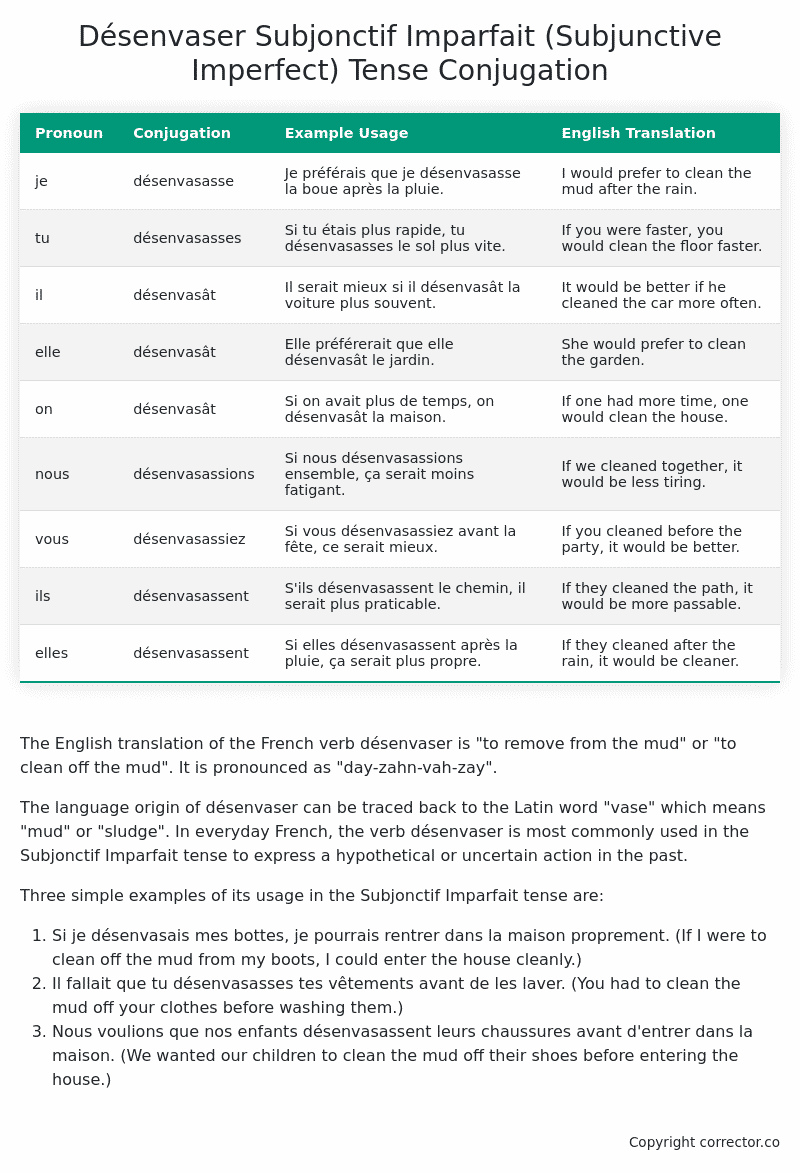Subjonctif Imparfait (Subjunctive Imperfect) Tense Conjugation of the French Verb désenvaser
Introduction to the verb désenvaser
The English translation of the French verb désenvaser is “to remove from the mud” or “to clean off the mud”. It is pronounced as “day-zahn-vah-zay”.
The language origin of désenvaser can be traced back to the Latin word “vase” which means “mud” or “sludge”. In everyday French, the verb désenvaser is most commonly used in the Subjonctif Imparfait tense to express a hypothetical or uncertain action in the past.
Three simple examples of its usage in the Subjonctif Imparfait tense are:
- Si je désenvasais mes bottes, je pourrais rentrer dans la maison proprement. (If I were to clean off the mud from my boots, I could enter the house cleanly.)
- Il fallait que tu désenvasasses tes vêtements avant de les laver. (You had to clean the mud off your clothes before washing them.)
- Nous voulions que nos enfants désenvasassent leurs chaussures avant d’entrer dans la maison. (We wanted our children to clean the mud off their shoes before entering the house.)
Table of the Subjonctif Imparfait (Subjunctive Imperfect) Tense Conjugation of désenvaser
| Pronoun | Conjugation | Example Usage | English Translation |
|---|---|---|---|
| je | désenvasasse | Je préférais que je désenvasasse la boue après la pluie. | I would prefer to clean the mud after the rain. |
| tu | désenvasasses | Si tu étais plus rapide, tu désenvasasses le sol plus vite. | If you were faster, you would clean the floor faster. |
| il | désenvasât | Il serait mieux si il désenvasât la voiture plus souvent. | It would be better if he cleaned the car more often. |
| elle | désenvasât | Elle préférerait que elle désenvasât le jardin. | She would prefer to clean the garden. |
| on | désenvasât | Si on avait plus de temps, on désenvasât la maison. | If one had more time, one would clean the house. |
| nous | désenvasassions | Si nous désenvasassions ensemble, ça serait moins fatigant. | If we cleaned together, it would be less tiring. |
| vous | désenvasassiez | Si vous désenvasassiez avant la fête, ce serait mieux. | If you cleaned before the party, it would be better. |
| ils | désenvasassent | S’ils désenvasassent le chemin, il serait plus praticable. | If they cleaned the path, it would be more passable. |
| elles | désenvasassent | Si elles désenvasassent après la pluie, ça serait plus propre. | If they cleaned after the rain, it would be cleaner. |
Other Conjugations for Désenvaser.
Le Present (Present Tense) Conjugation of the French Verb désenvaser
Imparfait (Imperfect) Tense Conjugation of the French Verb désenvaser
Passé Simple (Simple Past) Tense Conjugation of the French Verb désenvaser
Passé Composé (Present Perfect) Tense Conjugation of the French Verb désenvaser
Futur Simple (Simple Future) Tense Conjugation of the French Verb désenvaser
Futur Proche (Near Future) Tense Conjugation of the French Verb désenvaser
Plus-que-parfait (Pluperfect) Tense Conjugation of the French Verb désenvaser
Passé Antérieur (Past Anterior) Tense Conjugation of the French Verb désenvaser
Futur Antérieur (Future Anterior) Tense Conjugation of the French Verb désenvaser
Subjonctif Présent (Subjunctive Present) Tense Conjugation of the French Verb désenvaser
Subjonctif Passé (Subjunctive Past) Tense Conjugation of the French Verb désenvaser
Subjonctif Imparfait (Subjunctive Imperfect) Tense Conjugation of the French Verb désenvaser (this article)
Subjonctif Plus-que-parfait (Subjunctive Pluperfect) Tense Conjugation of the French Verb désenvaser
Conditionnel Présent (Conditional Present) Tense Conjugation of the French Verb désenvaser
Conditionnel Passé (Conditional Past) Tense Conjugation of the French Verb désenvaser
L’impératif Présent (Imperative Present) Tense Conjugation of the French Verb désenvaser
L’infinitif Présent (Infinitive Present) Tense Conjugation of the French Verb désenvaser
Struggling with French verbs or the language in general? Why not use our free French Grammar Checker – no registration required!
Get a FREE Download Study Sheet of this Conjugation 🔥
Simply right click the image below, click “save image” and get your free reference for the désenvaser Subjonctif Imparfait tense conjugation!

Désenvaser – About the French Subjonctif Imparfait (Subjunctive Imperfect) Tense
Formation
Common Everyday Usage Patterns
Interactions with Other Tenses
Subjonctif Présent
Indicatif Passé Composé
Conditional
Conditional Perfect
Summary
I hope you enjoyed this article on the verb désenvaser. Still in a learning mood? Check out another TOTALLY random French verb conjugation!


